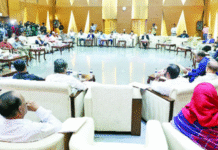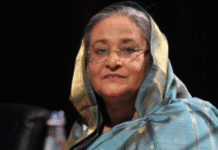
Last update on: Thu Jul 24, 2025 02:48 AM

“This is a historic step forward in our journey toward national consensus.”
In a significant development, political parties have unanimously agreed on a proposal on forming the Election Commission through a five-member search panel, a move described as a “turning point” in the national dialogue.
The committee will be chaired by the Speaker of parliament and include the deputy speaker (from the opposition), the prime minister, the leader of the opposition in parliament, and an Appellate Division judge nominated by the chief justice.
National Consensus Commission Vice-President Prof Ali Riaz said that there will be a separate law to make the Election Commission (EC) accountable to parliament. Under the law, election commissioners will also have a code of conduct.
Although yesterday’s talks at the Foreign Service Academy, the 18th meeting in the second phase of the dialogue, were originally set to cover appointments to multiple constitutional and statutory bodies, discussions ultimately focused on the EC.
After the meeting, Prof Riaz said all parties agreed to amend article 118 of the constitution to formalise the appointment process for the chief election commissioner and other commissioners.
Under the proposed changes, the search committee will recommend one candidate for each post. The president will then appoint them for a five-year term.
Candidate eligibility, application procedures, vetting, scrutiny and other details will be defined in the new law to be passed by parliament.
The committee must begin work at least 90 days before the expiry of an Election Commission’s term.
The Parliament Secretariat will provide logistical and institutional support to the search committee under the Speaker’s direction.
Under the existing Chief Election Commissioner and Other Election Commissioners Appointment Act, 2022, a six-member search committee, led by a judge from the Appellate Division of the Supreme Court, nominates potential election commissioners. The president eventually makes the final call.
Prof Riaz said, “This is a historic step forward in our journey toward national consensus.”
The agreement involved major compromises across party lines, he said, adding, “It opens the path for a truly independent and accountable Election Commission.”
BNP Standing Committee member Salahuddin Ahmed noted that the earlier idea of recommending two names per position had been dropped in favour of a single recommendation per post.
He stressed that the commission’s independence must be backed by a proper appointment process, not just mentioned in the constitution.
Recalling past commissions’ failure to function independently despite being constitutionally mandated, he highlighted the importance of a transparent and accountable commission.
He added, “Our movement’s main goal was to ensure elections under a neutral caretaker government. The nation has now broadly accepted this. All that remains is the legal process.
“In this context, the progress made on forming an effective, independent, and accountable Election Commission is crucial.”
Salahuddin reiterated the BNP’s stance of constitutionally protecting the EC’s formation. He said appointments to other bodies, such as the Public Service Commission, Comptroller and Auditor General, Anti-Corruption Commission, and Ombudsman, should be governed by mechanisms under existing laws, not constitutional amendments.
Jamaat-e-Islami’s Nayeb-e-Ameer Syed Abdullah Mohammad Taher called the discussion “constructive and positive”. The new system leaves no room for unilateral presidential discretion, he said.
He added that while the EC’s formation has been agreed upon, talks on other constitutional and statutory bodies will continue.
On the caretaker issue, he said discussions are nearing conclusion and an announcement is expected soon.
Akhtar Hossen, member secretary of the National Citizens Party (NCP), also hailed the agreement, but warned that appointments to other key institutions must also be constitutionally protected.
“In the past, authoritarian regimes gave unchecked appointment powers to the president. Today, we’ve agreed those powers must be limited,” he said.
“Previously, there was no legal framework for action against commissioners for misconduct or failure. Today, we’ve agreed to legislate such provisions,” he said.
He critiqued BNP’s preference for statutory safeguards over constitutional changes, saying, “Laws can be easily amended or repealed. Without constitutional backing, future governments could undo these reforms. That’s why we insist on embedding the search committee structure in the constitution.”
Akhtar cautioned that if parties attempt to finalise a national charter while bypassing core reforms, the NCP may withdraw from the dialogue.
Earlier in the day, the Communist Party of Bangladesh (CPB), Bangladesher Samajtantrik Dal, and Bangladesh JASAD staged a symbolic 10-minute walkout to protest “law enforcement’s action on students and guardians” following the jet crash at Milestone School & College.









